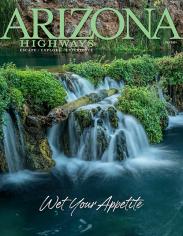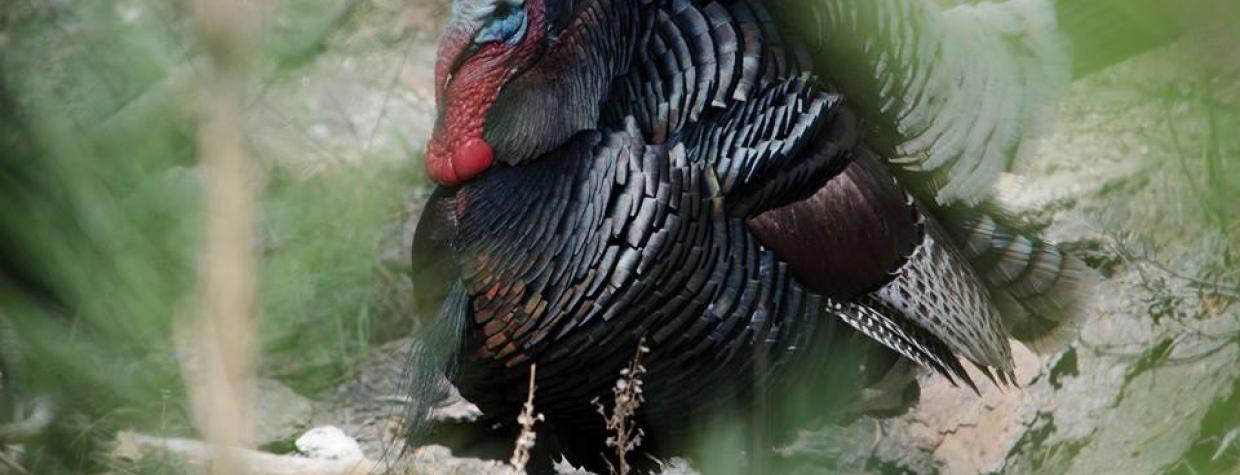EDITOR'S NOTE: The following story appeared in the now-defunct Along the Way section of the November 1993 issue of Arizona Highways. On behalf of everyone at the magazine, we wish you a happy Thanksgiving.
Jerome's First and Only Wild-Turkey Thanksgiving Banquet
By William Hafford
It's been said confession is good for the soul. Sometimes it can also be good for a laugh. I'm thinking particularly about the 1936 Thanksgiving banquet my father cooked up in Jerome, Arizona.
This affair took place in a town established on a mountainside called Cleopatra Hill, where the upper limits of the community were situated some 1,500 feet above the lower limits. Where, after dark, people locked their doors, went to bed early, and slept while the streets of the town shifted and settled. Large fissures often appeared overnight in the narrow asphalt thoroughfares. Buildings moved and leaned, and once the jail slid down the hill on which it perched.
The reason for Jerome's existence was copper. Mining operations had created an 88-mile maze of tunnels under the town and deep into Cleopatra Hill. This tunneling caused the mountainside — and the town — to remain in slow continuous motion.
In 1936, Jerome -- its copper deposits playing out -- was losing population fast. At the time, it appeared to be heading toward ghost-town status.
I had come to the town with my father, a civil engineer who was surveying for a stretch of highway.
Around the first of November, my father began talking to his survey crew about a turkey-hunting expedition into the wilds of the Mogollon Rim country. The turkeys, he believed, would be perfect for a huge Thanksgiving banquet that, he may have thought, would also serve as a sort of salute to a community that soon might be no more.
I recall that a group of ladies met in our living room one day to discuss the arrangements for the big event. And soon every square foot of banquet area in the local Conner Hotel had been reserved for Thanksgiving eve.
My father and his survey crew disappeared into the wilderness for a full three days, returning one early evening with so many turkeys that they entirely filled the bed of Buddy Cleveland's pickup. Now plans for the banquet moved ahead with vigor.
The Conner Hotel was not a fancy establishment by today's standards, but it was the only place in town that could accommodate a major banquet with a guest list of more than 200 people.
On the evening of the affair, the hotel's long tables were bedecked formally with white linen and candles. The men wore ties and jackets; the women, their finest dresses.
The event was a total success, complete with sparkling conversation, the clink of silverware and glasses … and beautifully browned turkeys, two or three to each table.
I was terribly proud of my father's accomplishment. Throughout the evening, the guests lavished him and his hunting companions with compliments. Said the mayor's wife, "I can actually taste the flavor of the wild acorns and piñon nuts."
Remarked a mine foreman, "I'm spoiled. I'll never eat another barnyard turkey again."
In the years that followed, I was graduated from high school, went on to college, moved to another state, and raised a family of five children. Then, about 45 years after the wild-turkey banquet, my father, then in his 80s, was felled by a stroke.
I traveled west to Phoenix to visit him. He had lost all use of one arm, and it took great concentration for him to coax even slight movement out of his right leg. His speech was slurred and sometimes difficult to understand.
We sat in his den reminiscing, when, at one point, he asked, "Do you remember the wild-turkey banquet in Jerome?"
I said I did, and for a few minutes we relived the occasion and all of its small-town glitter. Then, with a slight smile playing at the corner of his mouth, he said, "There's something I need to tell you. I and all of the men who went on that hunting trip took an oath of secrecy, but I think it's time I told someone.
"We wandered the Mogollon Rim for three days and never saw a single turkey track. But there was no way we could return home empty-handed. So we followed imaginary tracks to a poultry farm down in the Verde Valley where we paid the going price for a batch of standard barnyard birds."
I felt the smile forming. "What about all those remarks about the taste of wild acorns and piñon nuts?" I asked.
"Imagination. People have vivid imaginations. Corn and poultry feed. That's what those birds were raised on."
I laughed aloud, raised my hand to slap my knee and knocked a glass of iced tea to the floor, cubes scattering across the carpet. When I bent down to pick them up, I happened to look across at my dad. He had lapsed into a pensive mood, looking at the wall -- or perhaps beyond it -- looking back down the path of his long life. Seeing things that now existed only in memory. Reliving the past, knowing time was short.
Two weeks later — his confession made — he passed away.

